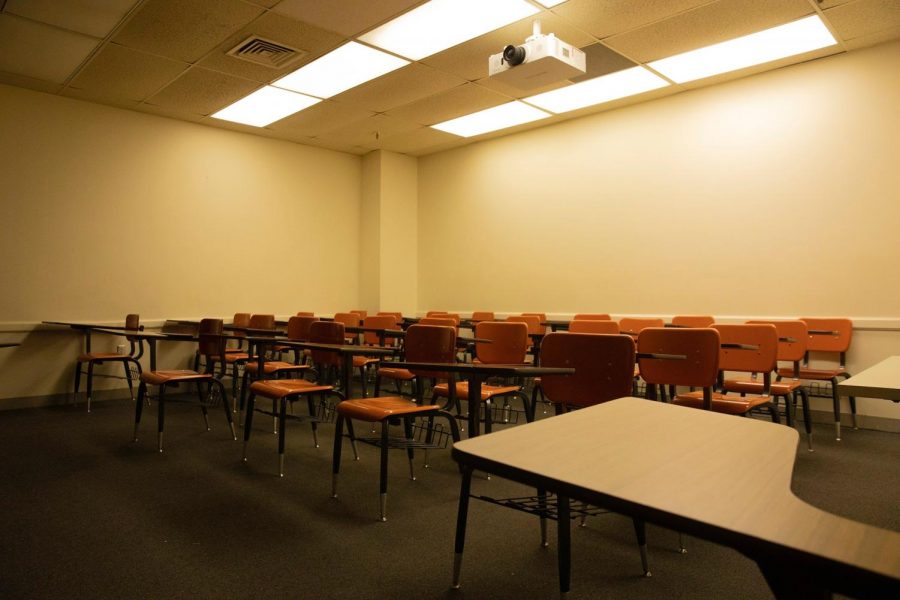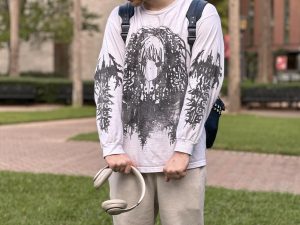Opinion: Tenure helps professors and students alike
A Loyola classroom sits empty in this March 11, 2020 file photo. Christopher Schaberg writes that faculty are better able to teach and serve their students when they have tenure or are on the tenure track. Photo credit: Cristian Orellana
February 6, 2021
I spent a lot of this winter break resting and reflecting on the whirlwind that was the fall 2020 semester. But I also spent many hours doing something else that is tangentially part of my job: filling out reference forms and writing recommendation letters for current and former students.
This is something that I’ve come to appreciate more and more, even as it is collateral labor that only accumulates over time.
Since I started teaching at Loyola in 2009, each year I have students and former students who ask me to serve as a reference for a job or an internship or to write a letter of support for a graduate program application. I value this part of my job, even though it is somewhat unofficial and often happens on weekends or during holidays; it’s my chance to pay it forward, to give back to all that my students have given during their time at Loyola, in the classroom as well as outside of class.
This work takes time, care and retrospection. It assumes that I have had sustained relationships with my students and that I have remained at Loyola and taught students throughout their time here. One important factor in my ability to sustain these relationships and write these letters is that I have employment stability as a member of the tenured faculty. While all of our faculty are committed to students, the institution is unequally committed to faculty.
This traditional investment by the university in permanent faculty is what allows students a corresponding trust in this key part of their education: that you can forge relationships with your professors, knowing that in two or four or 12 years, you can come back to us and ask for our guidance and support. It’s always an honor to do this. Even more, it’s a thrill to see how exactly my students thrive and bloom as they prepare to graduate or well after they’ve left Loyola.
But it is also so easily taken for granted, and this is especially reflected by trends in higher education that replace tenured and tenure-track faculty with contingent and part-time instructors. The rationale for this is that it lets a university be more flexible and nimble, adjusting to the whims of market demand and the vagaries of student interest. But it’s really about saving money, as tenured professors cost more to employ. And the ripple effects of this decision, for students, are disastrous.
When the university sheds permanent faculty and does not replace them, students miss out on opportunities to develop long-term relationships with mentors who will be there for them for years, during and well beyond their time at Loyola.
This is why I have been encouraged by our administration’s recent decision to convert two excellent Visiting Assistant Professors in the English department—Dr. Beth Watson and Dr. Scott Heath—to tenure track positions. It means that Dr. Watson and Dr. Heath now can rely on the university’s commitment to them—and that they can be here for you, for our students.
Permanent faculty are here for you to work with over multiple semesters, perhaps to do a senior capstone project with, or an independent study, or serve as a reference many years later, once you’ve developed a connection. This is one of the reasons you go to a school like Loyola, where you have the chance to work closely with your instructors and develop sustained relationships with them.
There are other benefits of tenure, for your instructors. These include academic freedom, job protection, benefits, sabbatical, summer months for research, and long-term interest in the health of the university. But arguably the most important benefit when it comes to students is this assurance: If you need support from your professors in the future—whether that’s in a year or 10 years—they will be at Loyola still, will remember you, and will be there for you. It’s part of our job.








Alum '07 • Mar 21, 2021 at 4:03 pm
Academic Freedom is the most important part of tenure. It’s important to have professors who can teach different perspectives without fear. As the woke mob continues to cancel anyone with opposing opinions, tenure is in many ways more important now than ever.